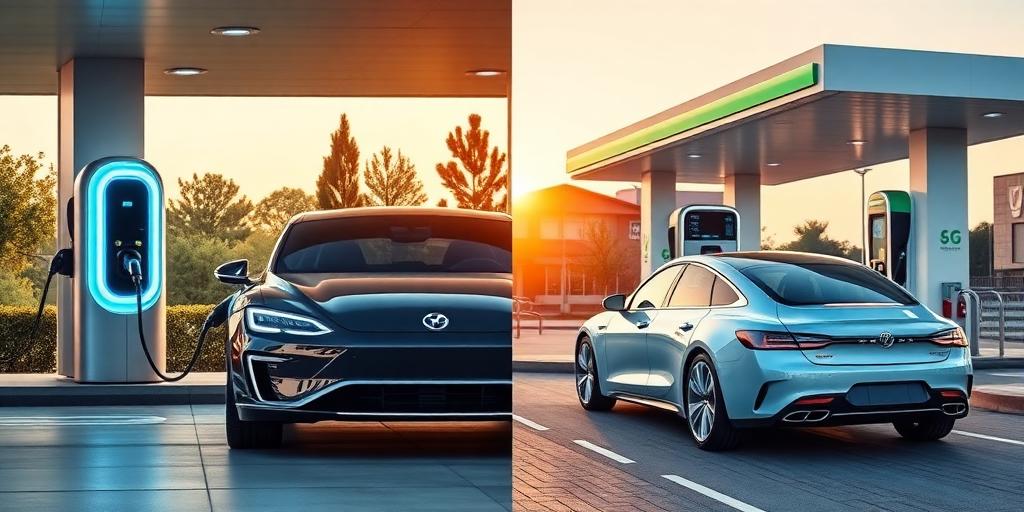EV vs. Petrol: A Comprehensive Analysis of Long-Term Savings
In an era increasingly defined by environmental consciousness and fluctuating fuel prices, the debate between electric vehicles (EVs) and traditional petrol cars has intensified. While the initial cost of EVs often raises eyebrows, a thorough examination of long-term expenses reveals a more nuanced picture. This article delves into the key factors influencing the total cost of ownership, providing an authoritative comparison to help you make an informed decision.
Upfront Costs: The Initial Investment
The most immediate difference lies in the purchase price. EVs typically command a higher initial investment compared to their petrol counterparts. This is primarily due to the cost of battery technology, which constitutes a significant portion of the EV's price. However, government incentives, tax credits, and rebates can substantially reduce this upfront burden, making EVs more accessible.
Fuel vs. Electricity: Running Costs
The operational costs represent a pivotal area where EVs demonstrate a distinct advantage. Electricity is generally cheaper than petrol, leading to significantly lower 'fueling' expenses. The exact savings depend on several variables:
- Electricity Prices: Local electricity rates play a crucial role. Charging during off-peak hours can further optimize savings.
- Petrol Prices: Fluctuations in petrol prices directly impact the running costs of petrol cars. Geopolitical events and market dynamics can cause considerable volatility.
- Driving Habits: Driving style and distance traveled influence fuel consumption. EVs often exhibit greater efficiency in urban environments with stop-and-go traffic.
To illustrate, consider a hypothetical scenario: a driver covering 15,000 miles annually. An EV with an efficiency of 3.5 miles/kWh, charged at an average rate of $0.15/kWh, would incur approximately $643 in annual electricity costs. A petrol car with a fuel economy of 25 mpg, consuming petrol at $4.00/gallon, would amount to $2,400 in annual fuel expenses. This represents a substantial saving of $1,757 per year.
Maintenance and Repair: Long-Term Reliability
EVs generally require less maintenance than petrol cars. The absence of an internal combustion engine, along with its numerous moving parts, translates to fewer maintenance requirements. Oil changes, spark plug replacements, and exhaust system repairs become obsolete. However, EVs do have unique maintenance considerations:
- Battery Health: Battery degradation is a primary concern for EV owners. Battery life typically ranges from 100,000 to 200,000 miles, and replacement can be a significant expense. However, warranties often cover battery performance for a specified period.
- Brake Wear: EVs utilize regenerative braking, which reduces wear on brake pads and rotors, extending their lifespan.
- Software Updates: EVs rely heavily on software, necessitating periodic updates to optimize performance and address potential issues.
Studies suggest that EVs have lower overall maintenance costs compared to petrol cars. A 2020 Consumer Reports study found that EV owners spend half as much on maintenance and repairs over the life of the vehicle.
Depreciation: Retaining Value
Depreciation represents a significant cost factor in vehicle ownership. The rate of depreciation varies depending on the make, model, and market conditions. Historically, EVs depreciated faster than petrol cars due to concerns about battery life and technological advancements. However, as EV technology matures and demand increases, depreciation rates are becoming more competitive.
Several factors influence EV depreciation:
- Battery Health: The condition of the battery significantly impacts resale value.
- Technological Advancements: Rapid advancements in EV technology can render older models less desirable.
- Government Incentives: The availability of incentives for new EVs can affect the value of used EVs.
Environmental Impact: A Non-Monetary Consideration
Beyond the financial aspects, the environmental impact is a crucial consideration. EVs produce zero tailpipe emissions, contributing to cleaner air in urban areas. While the manufacturing of EVs does have an environmental footprint, studies indicate that EVs have a lower overall carbon footprint compared to petrol cars, especially when powered by renewable energy sources.
Conclusion: Weighing the Factors
Determining whether an EV or a petrol car saves more in the long run requires a comprehensive analysis of individual circumstances. While EVs typically have a higher upfront cost, lower running costs and reduced maintenance expenses can offset this initial investment over time. Factors such as government incentives, driving habits, and electricity prices play a crucial role in determining the overall savings. Moreover, the environmental benefits of EVs contribute to a more sustainable future.
Ultimately, the decision hinges on a careful evaluation of your specific needs, financial situation, and environmental priorities. By considering all the relevant factors, you can make an informed choice that aligns with your long-term goals.









